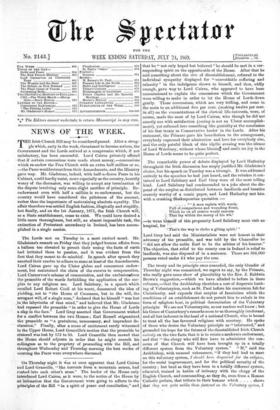On Thursday night it Was at once apparent that Lord
Cairns and Lord Granville, "like torrents from's, mountain source, had rushed into each other's arms." The leader of the House only introduced Lord Cairns, as it were, to the notice of the House by an intimation that the Government were going to adhere to the principles of the Bill "in a spirit of peace and conciliation," and
that he "not only hoped but believed "he should be met in a cor- responding spirit on the opposite side of the House. After that he said something about the date of disestablishment, referred to the individual sympathy displayed for "unavoidable suffering and calamity" in the indulgence shown to himself, and then, oddly enough, gave way to Lord Cairns, who appeared to have been commissioned to explain the concessions which the Government 'were willing to make in order to let the House of Lords down gently. These Concessions, which are very trifling, and come ia the main to an additional five per cent. (making twelve per cent. in all) on the commutations of the clerical life-interests, were, of course, made the most of by Lord Cairns, who though he did not exactly coo with satisfaction (cooing is not an Ulster accomplish- ment), yet softened into something like geniality at the conclusion of his first treaty as Conservative leader in the Lords. After his statement,. the Primate gave his benediction to the arrangement, everybody expressed their admiration and love for everybody else, and the only painful hlank of this idyllic evening was the silence of Lord Westbury, without whose blessinf and smile no joy in the House of Lords seems to be quite perfect.






























